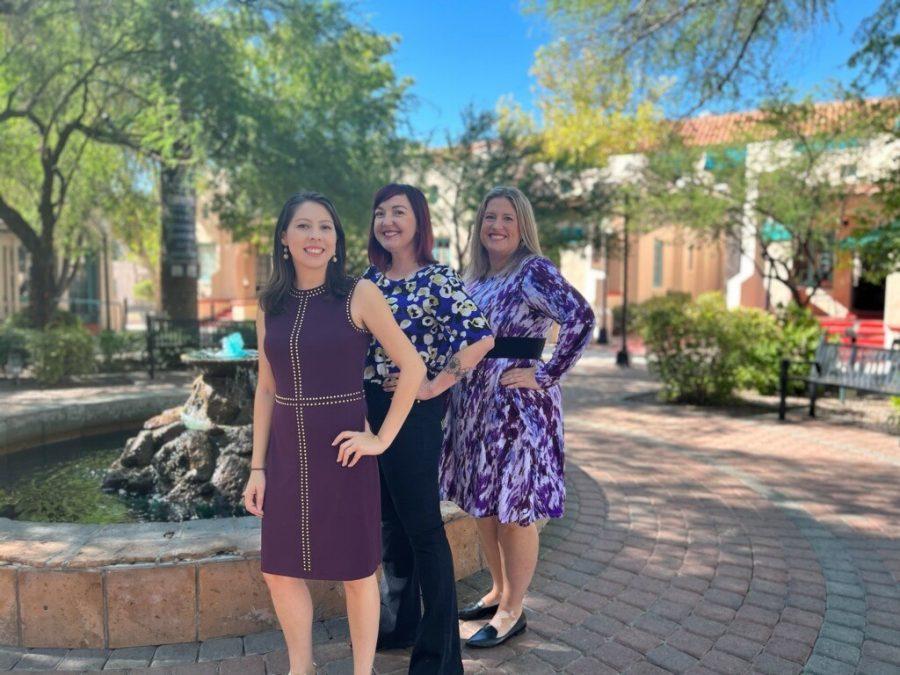One in three women and one in four men have experienced sexual violence in their lifetimes, according to the Centers for Disease Control and Prevention, who identifies it as a serious public health problem in the United States.
For Sexual Assault Awareness Month this April, the University of Arizona Consortium on Gender-Based Violence has partnered with local organizations to host a series of events that bring awareness to sexual violence.
The theme of this year’s awareness month is “The Truth About Teal,” which seeks to dispel myths about sexual violence through community building and opening up conversations on taboo topics not generally talked about.
“There are so many different myths that have existed for decades that really perpetuate the harm and contribute to victims feeling uncomfortable reporting,” said Katlyn Monje, director of the Southern Arizona Center Against Sexual Assault. “It contributes to perpetrators not being held accountable and victims not being believed.”
Students are also encouraged to wear teal in support of survivors of sexual violence. Southern Arizona Center Against Sexual Assault will be selling teal shirts, and proceeds will support efforts for next year’s April events and can be worn on Wednesday, April 27 for Denim Day, a day to show support in combating victim-blaming.
The day is based on the Italian Supreme Court’s decision to overturn a sexual assault case because the victim was wearing jeans that the judge deemed to be too tight to be sexually assaulted in.
“People wear jeans in recognition [that] it’s not the victim’s fault for being sexually assaulted,” said Cynthia Chapman, a community outreach professional for the UA Consortium on Gender-Based Violence. “And that things like that, of what people are wearing, does not make a difference and should not come into play.”
This is one of the many conversations that the Consortium on Gender-Based Violence hopes to address this month to bust myths and stereotypes.
On Monday, April 18 the university will host the Winding Road Theatre Ensemble which will perform “A Shot Away: Personal Accounts of Military Sexual Trauma,” addressing sexual violence in the military, a taboo topic. The show will start at 7 p.m. and be open to all students and staff at no cost.
The first event on campus will be a resource and crafting fair on Friday, April 14 organized by the Southern Arizona AIDS Foundation, the Anti-Violence Project and the university’s Survivor Advocates. It will be held at the Student Union Memorial Center from 12:30 p.m. to 4 p.m.
RELATED: Confidential support for survivors: UA’s Survivor Advocacy program
There will also be a talk on “Sexual Assault and Domestic Violence in the Wake of COVID-19” on Wednesday, April 13, by Elise Lopez, the director of the Consortium on Gender-Based Violence.
Other events include a “Take Back the Night” on Tuesday, April 19 at the House of Neighborly Service on 243 W. 33rd St. from 3:30 p.m. to 8 p.m. and other events that are virtual being held in the last week of April. The calendar of events with more links and information can be found the Southern Arizona Center Against Sexual Assault website.
“It’s a great opportunity to show our support for survivors because oftentimes, they have a significant fear of not being believed, or being judged and feeling very alone,” Monje said. “This is a great opportunity for individuals and groups in the community at large to really show our support and make a commitment to hopefully end sexual violence in our community.”
The Consortium on Gender-Based Violence
The Consortium on Gender-Based Violence will also be posting to their Instagram every day this month to share creative ways to raise awareness and connect with others working to end sexual violence.
The Consortium is a research and resource center that brings in an interdisciplinary approach to address gender-based violence on campus with different organizations and preventative efforts.
Some efforts include giving local bars free evidence-based training to recognize sexual aggression and stop it while maintaining a fun environment. Lopez recommended bars on Main Gate Square to reach out to the Consortium to receive these free training sessions to make college students safer and to educate service workers.
“For college students, it’s very normal to want to explore different things in life,” Lopez said. “Whether it’s sex, alcohol use, going to new places or meeting new people, so how can we create an environment where people can do those things and do them safely as well and still have fun?”
The Consortium has also been involved in efforts to expand a forensic examination site to Banner University Medical Center, which is used to collect evidence in cases of sexual assault. Previously, patients would have to be transferred to Tucson Medical Center to receive a forensic examination, which could add to the traumatic experience of being sexually assaulted.
Students can also attend monthly one-hour Zoom meetings to talk about how to address gender-based violence on campus. The Sexual Assault Response and Resources Team is a team of people from different disciplines across campus who want to improve survivor services and prevention on campus.
“We would really love to have student voices on there,” Lopez said. “It shouldn’t just be faculty and staff deciding what kind of services students need or what would be best for survivors. We really would love to have students of any background whether they’re survivors or not.”
Follow Susan Barnett on Twitter








